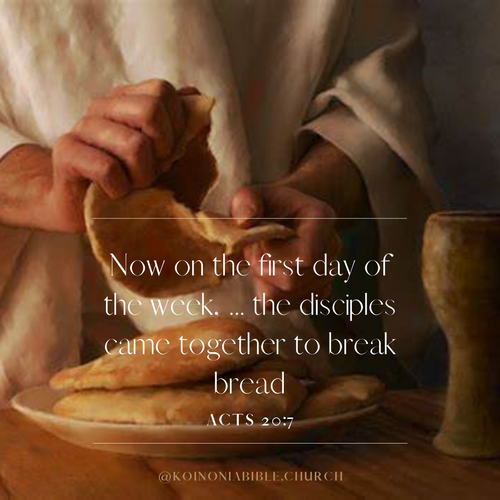Acts 20:7 — The Lord's Day

One of the false teachings that the Church had to deal with from the beginning is that we must obey the Law. Obedience to the Law as means to earn righteousness is still being taught today, as if some believers never read Galatians, Hebrews, or Romans. The Apostle Paul called this Judaizers' heresy, another gospel, a different gospel (Gal 1:6-7). There has been a renewed push over the past few decades to put Christians under the yoke of the Law. While, as Christians, we have the freedom to worship on Saturday, observe the Old Testament feasts, and observe Old Testament dietary laws, we do not have the freedom to put others under the yoke of the Law nor to think that observing the Law ingratiates God's favor.
One of the areas in which these new, disproved, and truly confused professing Christians have been advocating is that Christians need to worship on Saturday. Some claim that the Church always worshipped on Saturday until Constantine made Sunday the day that the Church should worship. Scripture, however, contradicts this view.
Acts 20:7 records the earliest references to Christians meeting for worship on Sunday, which was "the first day of the week." It could not be any more clear from this verse that the early Church was meeting on Sundays. Revelation 1:10 mentions the term "Lord's Day" which was understood to be Sunday. Jewish believers may have continued to observe the Jewish Sabbath as part of their Jewish customs, but Sunday (the Lord’s Day) was the day of worship for believers especially because it was the day of the resurrection.
This, however, does not mean that we ought to be dogmatic about meeting on Sunday. The Apostle Paul says in Romans 14:5-6:
In other words, which day we worship doesn't matter. If you think Saturday is the day you ought to worship, you are free in Christ to do so. However, you must not think that it makes you more righteous to do so. The same applies to Sunday. Insisting on Sunday gathering of the Church betrays a lack of understanding of what worship is. Our worship on Sunday ought to reflect a life of worship that had been lived out Monday through Saturday.
Are you living a life of worship every day of the week?
One of the areas in which these new, disproved, and truly confused professing Christians have been advocating is that Christians need to worship on Saturday. Some claim that the Church always worshipped on Saturday until Constantine made Sunday the day that the Church should worship. Scripture, however, contradicts this view.
Acts 20:7 records the earliest references to Christians meeting for worship on Sunday, which was "the first day of the week." It could not be any more clear from this verse that the early Church was meeting on Sundays. Revelation 1:10 mentions the term "Lord's Day" which was understood to be Sunday. Jewish believers may have continued to observe the Jewish Sabbath as part of their Jewish customs, but Sunday (the Lord’s Day) was the day of worship for believers especially because it was the day of the resurrection.
This, however, does not mean that we ought to be dogmatic about meeting on Sunday. The Apostle Paul says in Romans 14:5-6:
One person esteems one day above another; another esteems every day alike. Let each be fully convinced in his own mind. He who observes the day, observes it to the Lord; and he who does not observe the day, to the Lord he does not observe it.
In other words, which day we worship doesn't matter. If you think Saturday is the day you ought to worship, you are free in Christ to do so. However, you must not think that it makes you more righteous to do so. The same applies to Sunday. Insisting on Sunday gathering of the Church betrays a lack of understanding of what worship is. Our worship on Sunday ought to reflect a life of worship that had been lived out Monday through Saturday.
Are you living a life of worship every day of the week?
Posted in Book of Acts
Recent
Habakkuk 1:12–2:1— Appealing to the Throne of God
February 13th, 2026
Habakkuk: Trusting God in Troubled Times
February 6th, 2026
John 20:18–31 — Believing is Seeing
January 16th, 2026
John 20:1–17 — Love Turns Grief into a Mission
January 10th, 2026
John 17:20–26 — Jesus Prayer for All Believers
December 5th, 2025
Archive
2026
2025
October
2024
February
March
April
May
July
October
November
December
Advent 2024 Devotion: December 2Advent 2024 Devotion: December 3Advent 2024 Devotion: December 4Advent 2024 Devotion: December 5Advent 2024 Devotion: December 6John 3:16-21 — For God So Loved the WordAdvent 2024 Devotion: December 7Advent 2024 Devotion: December 8Advent 2024 Devotion: December 9Advent 2024 Devotion: December 10Advent 2024 Devotion: December 11Advent 2024 Devotion: December 12Advent 2024 Devotion: December 13Advent 2024 Devotion: December 14Advent 2024 Devotion: December 15Advent 2024 Devotion: December 16Advent 2024 Devotion: December 17Advent 2024 Devotion: December 18Advent 2024 Devotion: December 19Advent 2024 Devotion: December 20Advent 2024 Devotion: December 21Advent 2024 Devotion: December 22Advent 2024 Devotion: December 23Advent 2024 Devotion: December 24Advent 2024 Devotion: December 25
2023
January
February
March
April
May
